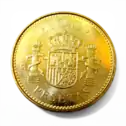Spanish peseta
The peseta (/pəˈseɪtə/, Spanish: [peˈseta]) was the currency of Spain between 1868 and 2002. It was also a used in Andorra (which had no national currency with legal tender).[1]
| Spanish peseta | |||||
|---|---|---|---|---|---|
| Peseta española (Spanish) | |||||
| |||||
| ISO 4217 Code | ESP | ||||
| User(s) | |||||
| Inflation | 1.4% | ||||
| Source | Cámara Guipúzcoa, 1998 | ||||
| ERM | |||||
| Since | 19 June 1989 | ||||
| Fixed rate since | 31 December 1998 | ||||
| Replaced by €, non cash | 1 January 1999 | ||||
| Replaced by €, cash | 1 March 2002 | ||||
| € = | 166.386 ₧ | ||||
| Subunit | |||||
| 1⁄100 | céntimo (Ctm/Cts) (because of inflation, céntimos were withdrawn from circulation in 1983) | ||||
| Symbol | ₧ or Pta/Pts | ||||
| Nickname | perra chica (5 Cts), perra gorda (10 Cts), pela (1 ₧), duro (5 ₧), talego (1,000 ₧), kilo (1,000,000 ₧) | ||||
| Coins | |||||
| Freq. used | 5 ₧, 25 ₧, 50 ₧, 100 ₧, 500 ₧ | ||||
| Rarely used | 1 ₧, 10 ₧, 200 ₧, 1,000 ₧, 2,000 ₧ | ||||
| Banknotes | |||||
| Freq. used | 1,000 ₧, 2,000 ₧, 5,000 ₧, 10,000 ₧ | ||||
| Rarely used | 200 ₧, 500 ₧ | ||||
| Central bank | Bank of Spain | ||||
| Website | [http://www | ||||
| Printer | Fábrica Nacional de Moneda y Timbre | ||||
| Website | [http://www | ||||
| Mint | Fábrica Nacional de Moneda y Timbre | ||||
| Website | [http://www | ||||
| This infobox shows the latest status before this currency was rendered obsolete. | |||||
References
- Brendan D. Brown (1979). The Dollar-Mark Axis: On Currency Power. Springer. p. 79. ISBN 9781349042456.
This article is issued from Wikipedia. The text is licensed under Creative Commons - Attribution - Sharealike. Additional terms may apply for the media files.

